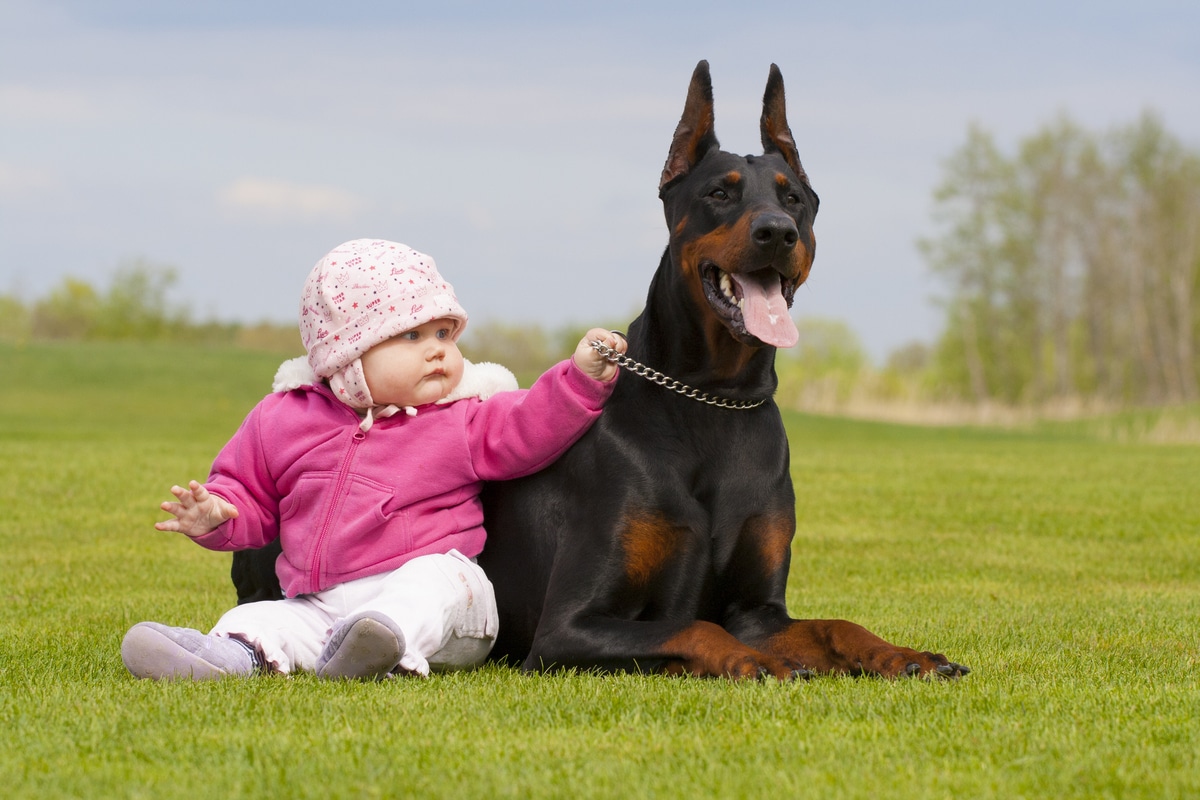When considering the suitability of a doberman as a family dog, it’s important to debunk common misconceptions. Despite their reputation as aggressive and fierce, dobermans can actually be excellent companions for families. In fact, they are known for their loyalty and protectiveness, which can make them a valuable addition to the household.
Originating in Germany, dobermans were initially bred as guard dogs. Their intelligence and obedience made them well-suited for this role. Over time, however, their temperament has evolved, and they have become more adaptable to family environments. Today, dobermans can thrive in loving and nurturing homes, where they can develop close bonds with their owners and provide a sense of security and comfort to the entire family.
The Doberman Pinscher can be a great addition to a family. They are intelligent, loyal, and protective, making them excellent guard dogs. With proper training and socialization, Dobermans can be gentle and affectionate with children. However, they are an active breed that requires regular exercise and mental stimulation. It’s important to remember that individual temperament can vary, so early socialization and training are essential. Overall, Dobermans can make wonderful family pets for the right owners.

Is Doberman a Good Family Dog?
Dobermans are often portrayed as aggressive and intimidating dogs. However, they can also make excellent family pets when properly trained and socialized. In this article, we will explore the characteristics of Dobermans that make them suitable for families and discuss the necessary considerations when adding a Doberman to your family.
1. Temperament and Personality
Dobermans are known for their loyal and protective nature, which can make them great family dogs. They are typically affectionate and bond closely with their owners. Dobermans are also intelligent and trainable, making them highly responsive to commands and capable of learning various tasks. Additionally, they are naturally alert and make excellent guard dogs, providing an added sense of security for the family.
However, it’s important to note that Dobermans are a highly energetic breed. They require daily exercise and mental stimulation to prevent boredom and destructive behavior. It’s essential to provide regular physical activity and engage in training sessions to keep them mentally stimulated and satisfied. With proper training and socialization, Dobermans can thrive in a family environment.
2. Playful and Loving Nature
Despite their reputation, Dobermans can be incredibly affectionate and loving towards their family members. They enjoy being part of the family activities and are known to form strong bonds with children. Dobermans are often playful and enjoy interactive games with their human companions.
It’s important to note that Dobermans can be large and strong dogs. Supervision is necessary when they interact with younger children to prevent any accidental harm due to their exuberance. Early socialization with children and other pets is crucial to ensure they grow up to be well-behaved and friendly family pets.
3. Trainability and Obedience
Dobermans are highly trainable dogs due to their intelligence and eagerness to please their owners. They excel in obedience training and can learn various commands and tricks with consistency and positive reinforcement techniques. Their natural intelligence allows them to understand and follow instructions, making them suitable for families looking for a dog that can be easily trained.
It’s important to start training Dobermans from a young age and use positive reinforcement methods such as treats, praise, and rewards. This helps establish a strong bond with the dog and makes the training sessions enjoyable for both the owner and the dog. Consistency and firmness are also essential to prevent any behavioral issues or dominance problems.
4. Exercise and Energy Levels
Dobermans have high energy levels and require regular exercise to keep them physically and mentally stimulated. Daily walks, playtime, and interactive activities are essential to prevent boredom and ensure their well-being. Engaging in activities like agility training, obedience training, or dog sports can provide additional mental and physical stimulation for Dobermans.
It’s not recommended to keep a Doberman in a small apartment or living space without access to a yard. These dogs thrive in environments where they have enough space to play and expend their energy. Lack of exercise can lead to behavioral problems, such as excessive barking, digging, or destructive behavior.
5. Socialization with Other Animals
Proper socialization is crucial for Dobermans to coexist peacefully with other animals, especially if you already have pets in your family. By exposing them to different animals and situations at a young age, you can help them develop positive associations and learn proper behavior around other pets.
It’s important to supervise initial interactions between your Doberman and other pets and provide positive reinforcement for calm and friendly behavior. With time and patience, most Dobermans can learn to live harmoniously with other animals and become a loving part of the family.
6. Grooming and Maintenance
Dobermans have short, sleek coats that require minimal grooming. Regular brushing helps keep their coat clean and reduces shedding. They only need occasional baths unless they get unusually dirty. Additionally, routine maintenance tasks such as nail trimming, ear cleaning, and teeth brushing should be part of their grooming routine.
It’s important to note that Dobermans are prone to certain health issues, such as hip dysplasia and dilated cardiomyopathy. Regular veterinary check-ups and a balanced diet are necessary to ensure their overall health and well-being. Providing a high-quality diet and maintaining a healthy weight can help prevent these health problems.
7. Considerations for Families with Children
While Dobermans can be wonderful family dogs, there are a few considerations to keep in mind, especially when there are young children in the family:
- Supervision is crucial, especially during interactions between the dog and children.
- Teach children how to properly interact with the dog, including gentle petting and appropriate play.
- Ensure that the Doberman has a safe space or crate where they can retreat if they need some alone time.
- Establish consistent rules and boundaries for both the dog and children to prevent any misunderstandings or conflicts.
8. Choosing the Right Breeder or Rescue
If you’ve decided that a Doberman is the right fit for your family, it’s essential to choose a reputable breeder or consider adopting from a rescue organization. A responsible breeder will prioritize the health and temperament of their dogs and provide proper socialization for the puppies.
If you choose to adopt, rescue organizations can help match you with a Doberman that fits your family’s lifestyle and needs. They often assess the dog’s behavior and temperament before placing them in a home, providing you with valuable information.
9. Training and Socialization
Regardless of whether you choose a puppy from a breeder or an adult dog from a rescue, training and socialization should be a priority. Enroll in obedience classes or seek the guidance of a professional dog trainer to ensure that your Doberman receives proper training.
Additionally, expose your Doberman to various environments, people, and animals to help them become well-rounded and adaptable. This will contribute to their ability to fit into your family dynamic and be comfortable in different situations.
10. The Importance of Commitment and Time
Adding a Doberman to your family is a long-term commitment. These intelligent and energetic dogs require regular exercise, mental stimulation, and attention from their owners. Make sure you have enough time and resources to devote to your Doberman’s needs.
Consider the necessary time for training, exercise, grooming, and socialization. Dobermans thrive when they have a job to do and are included as valuable members of the family.
Are Dobermans Good Family Dogs?
In conclusion, Dobermans can make excellent family dogs when given the right training, socialization, and care. Their loyalty, affectionate nature, and protective instincts make them great companions for families. However, it’s important to consider their high energy levels and commitment required to meet their needs.
Key Takeaways:
- A Doberman can make a great family dog with proper training and socialization.
- They are intelligent and loyal, making them excellent companions.
- Dobermans are protective of their family and can be a good deterrent to intruders.
- However, they require regular exercise and mental stimulation to prevent boredom and destructive behavior.
- It’s important to teach children how to interact with Dobermans safely and supervise their interactions.
Frequently Asked Questions
In this section, we have answered some frequently asked questions about Dobermans as family dogs. If you have any more questions, feel free to reach out!
1. Are Dobermans good family dogs?
Yes, Dobermans can make excellent family dogs. They are known to be loyal, protective, and affectionate towards their family members. However, it’s important to note that Dobermans require good training, socialization, and regular exercise to thrive as family pets.
Dobermans are intelligent and eager to please, which makes training them relatively easy. They can be great with children if they grow up together and are properly socialized. However, due to their strong protective instincts, it is recommended to supervise interactions between Dobermans and young kids to ensure everyone’s safety.
2. What is the temperament of a Doberman?
The Doberman breed is known for its loyal, alert, and obedient temperament. They are generally energetic and intelligent dogs that require mental and physical stimulation to stay happy and healthy. Dobermans are also known for their protective instincts, which makes them excellent watchdogs.
While Dobermans can be friendly and affectionate towards their family, they may be reserved or aloof with strangers. Early socialization and positive experiences with various people, animals, and environments can help ensure a well-rounded and sociable Doberman.
3. Do Dobermans get along well with other pets?
Whether a Doberman gets along with other pets largely depends on their individual personality and early socialization. With proper training, socialization, and gradual introductions, Dobermans can coexist peacefully with other animals in the household.
It’s important to note that Dobermans have a strong prey drive, so they may not be suitable for households with small pets like birds or rodents. Supervision and caution should be exercised when introducing a Doberman to other animals to ensure their safety and compatibility.
4. How much exercise do Dobermans need?
Dobermans are an active breed that requires a good amount of exercise to channel their energy. They thrive in an environment where they can engage in regular physical activities like long walks, runs, or play sessions. At a minimum, Dobermans should have at least one hour of exercise every day.
Lack of exercise can lead to boredom and potentially destructive behavior in Dobermans. Providing mental stimulation through obedience training, puzzle toys, or agility games can also help keep them mentally engaged and prevent boredom.
5. Do Dobermans require a lot of grooming?
Dobermans have a short and sleek coat that requires minimal grooming. They are low shedders and only need occasional brushing to remove dead hair and keep their coat looking neat. Regular nail trimming, teeth brushing, and ear cleaning should also be part of their grooming routine.
However, it’s important to note that Dobermans are prone to certain health conditions, including skin issues. Regular veterinary check-ups and proper nutrition are essential for their overall health and well-being.

In summary, the Doberman can be a good family dog if properly trained and socialized.
They are loyal and protective, making them great companions for families who prioritize safety. However, they do require a lot of exercise and mental stimulation to prevent boredom and destructive behavior.
